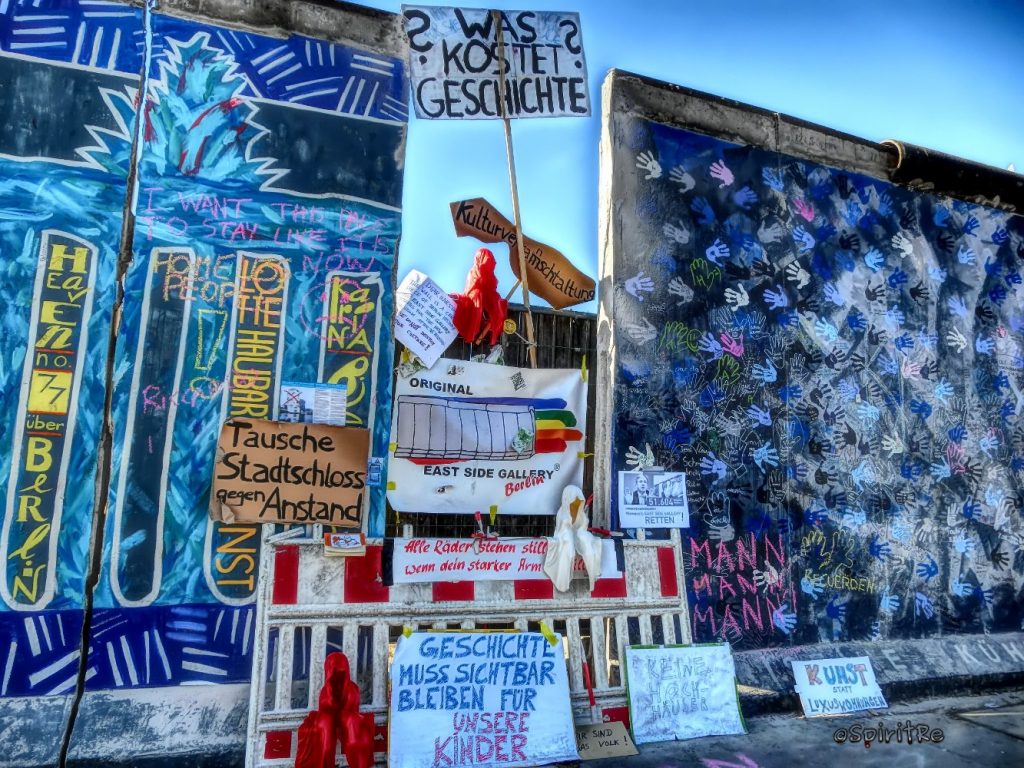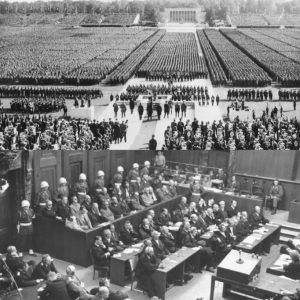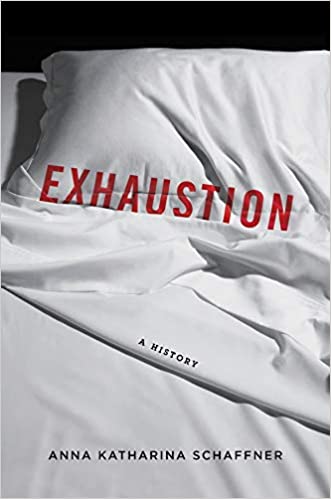 Isabelle Grime took the History of Emotions undergraduate module at Queen Mary University of London during 2020-21, and is now about to start an MSt in medieval history at Oxford.
Isabelle Grime took the History of Emotions undergraduate module at Queen Mary University of London during 2020-21, and is now about to start an MSt in medieval history at Oxford.
In this post, one in a series of contributions by QMUL students to the History of Emotions blog, Isabelle uses the history of emotions to explore a emotion felt about…history, especially in Germany.

A portion of the Berlin Wall’s East Side Gallery after with signs protesting its removal. Manfred Kielnhofer, Light Art Biennial Exhibition, 2013
Signs read: What does history cost? [middle, top] and ‘History must remain visible for our children’ [middle, bottom]
The German language possesses a wondrous ability to mesh words together and create new ones which pinpoint, often with almost eye-watering accuracy, emotions that you may never have known you’d experienced – until you see them encapsulated in a string of letters. Think schadenfreude, pleasure derived from another’s misfortune, or fernweh, painful longing for a far-away place. Recently, I stumbled across another, similarly untranslatable, but poignant emotion-word that I’d like to introduce you to: geschichtsmüde.
Combining ‘geschichte’ (history) and ‘müde’ (weary), geschichtsmüde is literally the feeling of being ‘weary of history’. I know what you’re thinking: didn’t you just call this emotion untranslatable?… That’s a good question. When grappling with geschichtsmüde, I feared it may be impossible to truly understand an emotion seemingly so entrenched in a language and culture that was not my own. I have experienced weariness, and studied history for as long as I can remember, but their fusion in a German context appears to create an emotion as ambiguous as it is acute.
In answering this problem, I turned, as I often do, to Twitter.
Appealing for ideas of what it might mean to experience geschichtsmüde, responses to this tweet identified a spectrum of potentially intersecting feelings. Laziness, ignorance, guilt and pain all fell under the umbrella of a geschichtsmüde triggered by the tumultuous history of Germany’s Third Reich (discussed in this podcast series). An intriguing element of geschichtsmüde illuminated through twitter testimonies and a conversation with a German friend was that despite it being ‘kind of everywhere’, geschichtsmüde as a defined emotion hasn’t been widely used in Germany. Thinking about it, this is the answer I needed; you don’t have to be aware that an emotion labelled geschichtsmüde exists to feel it, and so it is possible that it can be experienced in other linguistic and cultural circles.
But is this ‘weariness’ as simple as boredom with your own history, or could it be a more existential tiredness, accumulating over generations? In Exhaustion: A History, Anna Schaffner envelops these fatigue-related emotion-words and tells their story over time. Discussing this with National Geographic, Schaffner suggests ‘what changes throughout history is not that we are worried about exhaustion, but the ways in which we explain our exhaustion’, elucidating that it is possible for the feeling to stay the same whilst its object mutates. It makes sense that history, a dynamic object, has created its own brand of exhaustion in geschichtsmüde.
This Google Ngram search indicates that geschichtsmüde was first discussed in German works around 1865, coinciding with the build-up to the unification of Germany as a nation-state in 1871, a period likely punctuated by reflection on the past. Other observably high points of people feeling geschichtsmüde, or at least writing about the feeling, occurred in the decades after the First and Second World Wars, as well as around watershed moments of the Cold War, such as the fall of the Berlin Wall in 1989. This clearly suggests there is a history of being ‘weary of history’; what changes is not the emotion itself, but the event, or chain of events, by which it is triggered. Like Schaffner suggested, as the scroll of history further unfurls, new explanations of geschichtsmüde emerge.

The pre-WW2 Nazi Nuremberg Rallies [above, via BBC] and the post-WW2 trials of the same name, prosecuting Nazi leaders [below, via HistoryExtra]
The history-weariness felt collectively amongst Germans, bound by the need to prevent the reoccurrence of historical atrocities, paints it as a culturally-embedded emotion. However, this is not to say that geschichtsmüde can’t occur on an individual level. Douglas Murray describes it as something ‘modern Europeans can feel at almost any time’, but something that he felt alone on a flight over Nuremberg, a city with a tortured history. A personal geschichtsmüde was implied in Prince Harry’s recent, heart-breaking revelation that his ‘biggest concern is history repeating itself’, alluding to the parallels between Princess Diana and Meghan Markle, both plagued by the press and ostracised by the British Royal Family. It seems here that tragedy, shared or private, is a common thread tying together experiences of geschichtsmüde.

Is history repeating itself?
Prince Harry, pictured with Princess Diana [above, via Today] and Meghan Markle [below, via Elle]
However, weariness is not a foregone conclusion of history’s tragedies; this depends on the way you are confronted by them. As an undergraduate historian, revisiting the past is something I have actively chosen to do. But can this still create geschichtsmüde? In an introspective (not-so) deep-dive, I recalled the moment in September 2017 when I sat down to write a personal statement to study history at university. In that slightly pretentious, pseudo-intellectual style, typical of an 18-year-old lobbying an admissions officer for a place on their course, I wrote that I had been ‘enticed’ to study history due to the ‘pervasive power of its paradigms and their ability to augment our understanding of societies past and present’ (yes, I’m cringing too).
Rather less embarrassingly, to illustrate this, I used the example of Sankofa, a term belonging to the Ghanaian Akan tribe, often depicted as a bird with its feet facing forward whilst its head is turned back, designed to convey that ‘one must return to the past in order to move forward’. Apparently, at this stage of my life, I felt nothing akin to weariness where history was involved.
Is it possible, though, that Sankofa, albeit more of a belief system than an emotion, could create geschichtsmüde, when the history we examine is too painful to move forward from? It seems this may too depend on whether we are unwillingly confronted by the past, like Prince Harry, or if we choose to retrieve it ourselves. ‘In our struggle to overcome weariness’, writes Schaffner, we may find ‘a more significant effort to master ourselves’. This brings to mind another German word, vergangenheitsbewältigung, defined here by the Collins German-English dictionary as the process of ‘coming to terms with the past’.
Though vergangenheitsbewältigung is as steeped in history as geschichtsmüde, I can’t help but think that the former seems a more productive, positive outcome of Sankofa, whereas geschichtsmüde is something we desire to fix. In 1974, then-Federal President of Germany, Gustav Heinemann, launched a history competition for the country’s young people, whose exploration of and engagement with a range of themes from German history he hoped would remedy the ‘history-weary times’ they had slipped into. In 2017, President Frank-Walter Steinmeier said he felt no traces of geschichtsmüde thanks to the reinvigoration of history through entries in the competition. It seemed that by returning to a different aspect of Germany’s past each year, they were finally able to move forward. And, as I move forwards to an MSt in History, I am fortunate to say that geschichtsmüde hasn’t crept up on me quite yet.
Further reading:
Anna Katharina Schaffner, Exhaustion: A History (New York: Columbia University Press, 2016)
Christel N. Temple, ‘The Emergence of Sankofa Practice in the United States: A Modern History’, Journal of Black Studies, 41:1, 2010, pp. 127-150
Douglas Murray, The Strange Death of Europe: Immigration, Identity, Islam (London, Bloomsbury, 2017)
Marco Zerwas, ‘The German Federal President History Competition. A Public History Occasion’, in Marko Demantowsky (ed.), Public History and School, (Berlin: De Gruyter Oldenbourg, 2018)
Vicki Lawrence, ‘Vergangenheitsbewältigung: Coming to Terms with the Nazi Past’, Agni, 48: The Translation Issue, 1998, pp. 100-114


